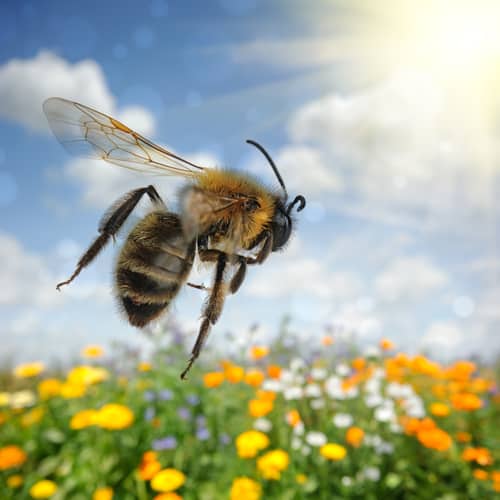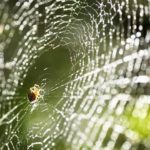
Spring time is here and that means it’s time to get back outside and enjoy the great outdoors. One of our favorite ways to do this is to do some gardening. When you’re outside in your yard or garden, you’re going to run into lots of insects. However, unlike household pests, the vast majority of garden insects are actually harmless. And many of them are even beneficial to your flowers, vegetables, shrubs and other plants! However, there are a small number of garden pests out there, lurking in the weeds and waiting to destroy all your hard work. Today, we want to help you identify which insects are good for your garden and which ones are bad, how you can tell them apart and—most importantly—how you can get rid of the harmful pests without damaging your plants or killing any of the good insects.
Beneficial Insects
Pollinators: there are all kinds of beneficial pollinators that live in our yards and gardens and help make them more beautiful. This includes bees, butterflies, dragonflies and more! Thankfully, it is easy to attract and encourage these types of insects. The pollinators in your area will be naturally attracted to the plants that grow there naturally—so do some research on native plants and make sure to include some of those. Other pollinator favorites include goldenrod, beebalm, sunflowers, coneflowers, honeysuckle and wheatgrass.
Ladybugs: we all know and love the ladybug, but did you know they’re actually great for your garden, too? They devour some of the most damaging garden pests, including aphids, multiple kinds of mites and the eggs of both. To attract ladybugs to your garden, grow lots of flowers and herbs that give them access to nectar. They are particularly attracted to daisies, dill and mint.
Detrimental Insects
Leafhoppers: if you’re growing vegetables, leafhoppers are public enemy number one. They prefer potatoes, lettuce, peppers and beans and their toxic saliva leaves behind leaves that look burnt or shriveled. It also stunts plant growth. These insects are usually green, brown or yellow and often stripped. To prevent leafhoppers, make sure to remove weeds and leaf debris from your garden each fall (leafhoppers will hunker down in these plants throughout the winter and reemerge in the spring) and place garden nets over the vegetable plants usually targeted by leafhoppers. You can also encourage parasitic wasps which feed on leafhoppers.
Pepper Maggots: peppers are favored by new and experienced gardeners alike for their versatility and their ease of growing. However, pepper maggots can ruin all of that. These maggots are the larvae of a fly that lays eggs in the skin of the pepper, causing the pepper to change color prematurely and rot on the vine. While it is called a pepper maggot, these pests will target anything in the pepper family—including tomatoes and eggplants. The best way to handle pepper maggots is to prevent them altogether. You can hang fly traps above pepper plants to capture adult flies before they lay their eggs and make sure to remove any rotten tomatoes or peppers from your garden at the end of growing season to prevent maggots from developing in those.
Aphids: these are tiny, round insects which attach themselves to the undersides of plant leaves and feed on plant juices. They come in a variety of colors to match plant leaves and because of this, and their small size, can be hard to spot before an infestation has overtaken a plant. While a few aphids will not do too much damage, they reproduce quickly and a large infestation will quickly kill off plant leaves. You can avoid attracting aphids by keeping nitrogen levels low when fertilizing. If you notice they have accumulated on your plants, you can get rid of them by releasing insets that eat aphids—like ladybugs—or by spraying the plants with Neem Oil—which will also get rid of any fungal diseases.
While most of these bugs are content to stay in the garden, they will occasionally find their way inside. So if you need any help keeping any of these garden pests out of your home, or have any further questions about which ones are dangerous and which ones aren’t, contact the experts at Arrow Exterminators right away. We have trained pest control experts waiting to help you answer any pest control question that comes your way! You can also find us Facebook and Google+ for more pest prevention tips and tricks.





